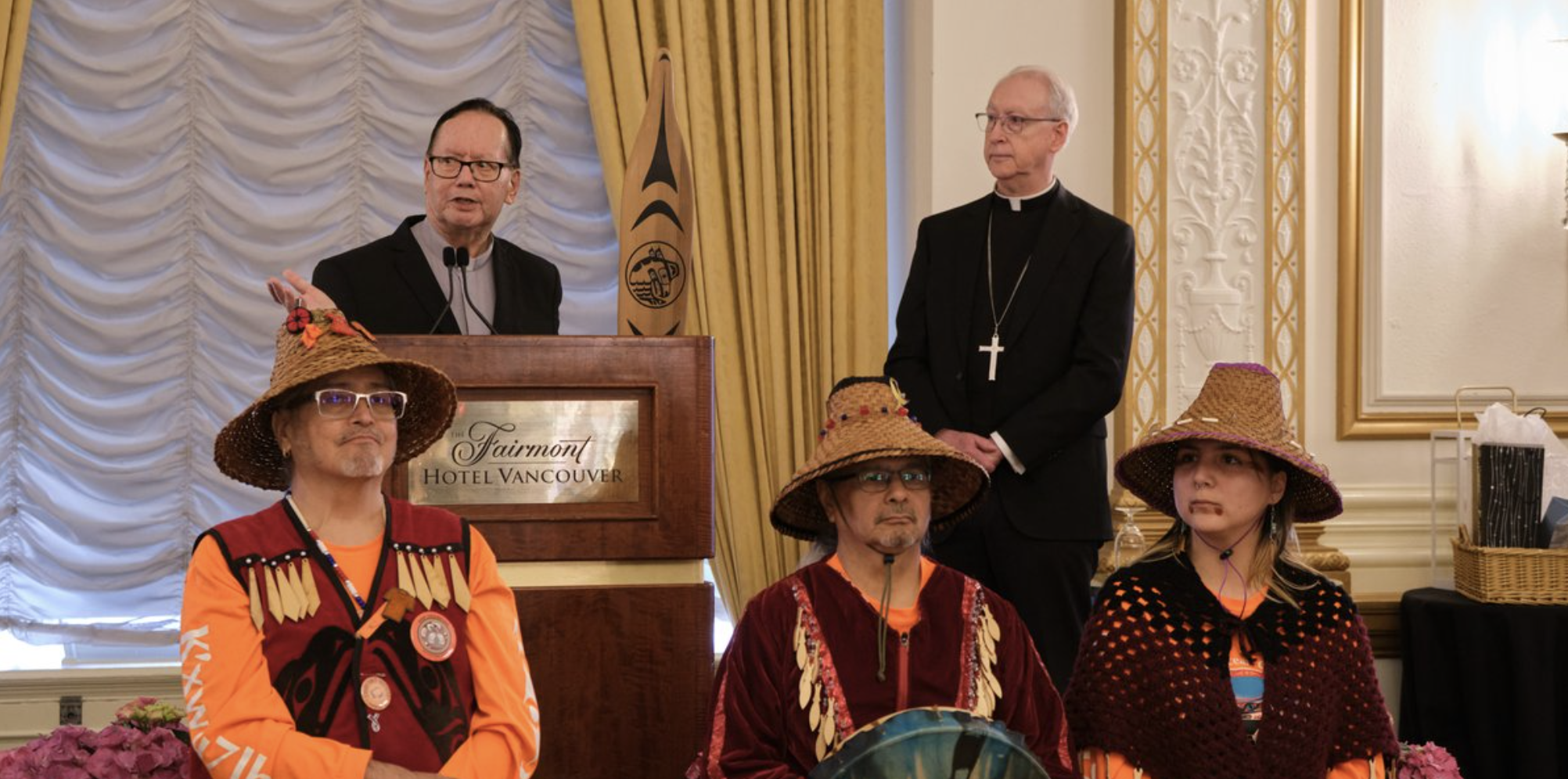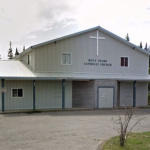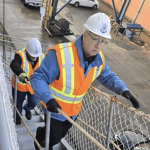VANCOUVER — In a ceremony steeped in tradition, drumbeats and booming voices filled the Fairmont Hotel Vancouver ballroom as Squamish First Nation drummers brought an Indigenous welcome at a reception for Archbishop Richard Smith.
Invoking the intercession of Mary for the hundreds gathered, the drummers sang, “Mother of Christ the king, have mercy on us all, on all us human beings. Have mercy on us all, on all us human beings.”
Councillor Sempúlyan Stewart Gonzales of the Squamish Nation Council told Archbishop Smith, “That song we offer you, it comes from our ancestors.”
Recounting the shared history of Vancouver Indigenous and non-Indigenous, he described how Squamish women paddled their canoes across Burrard Inlet to come to the aid of Vancouver residents during the 1886 fire that destroyed large parts of the city. Singing a Paddle Song to comfort those they rescued from the water, the Squamish people opened their homes and St. Paul’s Church on the North Shore to offer shelter to the victims.
Archbishop Smith received a ceremonial paddle from Catholic Deacon and Squamish Elder Rennie Nahanee as part of the welcome ceremony.
Gonzales told him that when holding the paddle on land, it should be pointed upward—to the sky, to heaven, and to God.
“On behalf of Squamish Council, we are honoured to welcome the new archbishop,” said Gonzales.
Expressing his gratitude for the paddle, Archbishop Smith—who was instrumental in coordinating Pope Francis’ 2022 healing and reconciliation visit to Canada—said that walking with Indigenous peoples through the truth and reconciliation process has taught him much about Indigenous culture and wisdom.
He spoke of his hope that local Indigenous peoples will become “friends—allow us to walk with you, and paddle with you in the future and learn from you. I do look forward to our collaboration and relationships. Thank you for your welcome.”
Gonzales also addressed darker parts of Church and Indigenous history, saying that even among the welcome delegation there are survivors of residential school and the Sixties Scoop, in which thousands of First Nations children were removed from their families by the Canadian government.
“As people of the Catholic faith we understand that history is real,” Gonzales said. “We are still here, regardless of what happened … We live and breathe our culture.”
Kevin Barlow, who co-chairs the Archdiocese’s Indigenous Healing and Reconciliation Fund, told the archbishop that the tragic history of Indigenous people in Canada is comprised of “wave and wave” of trauma. “There is still a lot of work to do.”
The reconciliation fund has accomplished some important work, said Barlow, highlighting a grant given to the Dr. Peter Centre near St. Paul’s Hospital in Vancouver, which now provides care that honours Indigenous traditions for those living with HIV and other complex health needs.
Such projects have a concrete effect on the local community, said Barlow, who emotionally recounted how a local Indigenous woman turned to the centre after her son’s overdose.
“It was a non-Indigenous centre,” said Barlow, “but the fund has allowed those opportunities for Indigenous and non-Indigenous people to come together.”
Grants have also helped with Indigenous language translation projects, supported local Indigenous athletes, and funded cultural initiatives such as The Cost of Silence, a film addressing the trauma of sexual abuse, among other efforts.
“I want to thank you for all the support to the Indigenous fund,” said Barlow. “It’s self-generated by the Catholic community.”
Barlow then acknowledged, “There was a time when I was almost going to leave the Catholic Church.” With tears in his eyes, he continued, “But lo and behold, I got in contact with [Archbishop Miller’s delegate James Borkowski], who brought me into this opportunity where I saw what we were doing.”
Barlow admitted, “Sometimes I get angry, but I can also see that there are genuine efforts to help heal those wounds.”
He ended by proposing that “Instead of the doctrine of discovery”—the 15th-century papal bulls used to seize territory in newly ‘discovered’ lands—”why not have the doctrine of recovery?”




